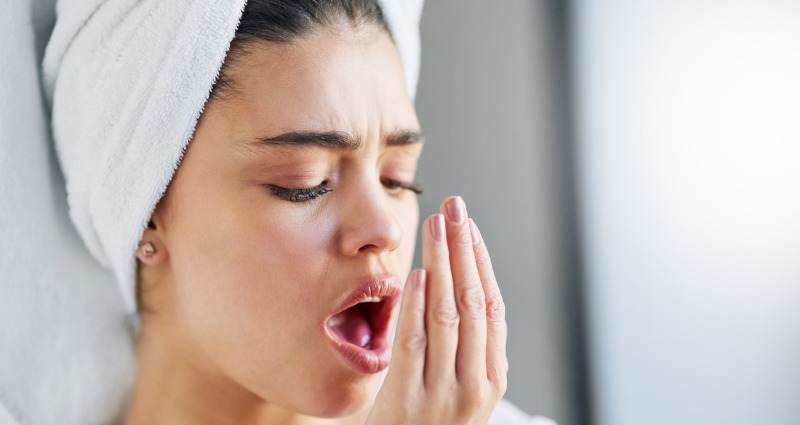Bad breath is something we all want to avoid, especially while speaking in social situations. Luckily there are a few things you can do to reduce the chance of developing a bad breath, also referred to as halitosis. While there’s no cure for bad breath, you can help to reduce the smell if it does occur.
Main Causes of Bad Breath
There are several causes of bad breath, but luckily most of them can be avoided.
High Levels of Bacteria in the Mouth
Bacteria in the mouth increases due to poor dental hygiene. If you don’t brush twice daily and floss, food particles remain in the mouth and the bacteria numbers increase. The bacteria releases sulphur compounds which make breath smell. High bacteria levels and poor oral hygiene can cause tooth decay and infections around the teeth known as periodontitis, which can also lead to bad breath.
Smelly Foods
The most obvious cause of bad breath is strong smelling foods. Foods such as onion, garlic and tinned tuna can give you bad breath. Even dairy foods can cause bad breath due to the bacteria in your mouth feeding off the amino acids in milk, cheese and cream. Some people are more susceptible than others with the odor staying on their breath for longer.
Smoking and Drinking Alcohol
Other obvious causes of bad breath are smoking and consuming alcohol. Smoking causes odor in the mouth and breath. Drinking alcohol can also cause bad breath particularly if the alcoholic drink has a strong smell, such as red wine and spirits.
Dry Mouth
Some people have a dry mouth with little saliva. It’s saliva that helps remove food particles and reduce bacteria in the mouth. When little or no saliva is produced, the mouth becomes dry and bad breath is likely to result. A dry mouth is what usually causes ‘morning breath’, but many people suffer from a dry mouth throughout the day. The most common cause for this is some prescription medications turn off or reduce saliva production.
Bad Breath and Braces
When you have braces, you’re at a slightly greater risk of bad breath. Maintaining oral hygiene while you have braces is important in avoiding bad breath, particularly as braces create plenty of crevices for food to become lodged and bacteria to thrive. Brushing after each meal can help to ensure that your teeth and braces are free of bacteria and food. no food caught in your braces. If you can’t brush after lunch, rinse your mouth thoroughly. Flossing twice daily will remove food and plaque caught between teeth.
How to Clear Bad Breath
There are a few things you can do to protect yourself from bad breath. Most of them are simple tips that can be combined for extra protection.
Daily Oral Hygiene
The most simple yet effective way of reducing the risk of numerous dental problems is to brush and floss twice a day. Use a soft bristle brush and take your time to get into all the tiny crevices in the mouth where bacteria and plaque can hide. Poor oral hygiene has the potential to cause conditions such as gingivitis, which can also cause bad breath.
Mouthwash
If you want extra protection against bacteria, try a mouthwash after brushing and flossing. The benefit of a mouthwash is that it can get into the tiny places between teeth and around the brackets and wires that you may miss with the brush.
Clean Your Tongue
Cleaning your tongue can reduce the bacteria in the mouth that leads to bad breath and plaque build up. There are a couple of methods for cleaning the tongue. Some people like to use their toothbrush to brush their tongue with light forward and backward strokes along the top, while others prefer to use a tongue scraper. The tool is run along the tongue from back to front while applying light pressure. The tongue scraper is considered to be the most effective method of cleaning the tongue. A mouthwash can also help remove bacteria and plaque from the tongue.
Stay Hydrated
A dry mouth that lacks saliva is ideal for the growth of bacteria. By drinking plenty of water throughout the day, you’re more likely to produce saliva that helps keep the bacteria at bay.
Make Good Food Choices
It’s not just the smelly foods listed above that are likely to give you bad breath. A diet that’s high in sugar not only puts you at higher risk of tooth decay, but also increases the chance of bad breath. The bacteria in the mouth feeds on sugar which in turn causes bad breath. Sugary, sticky food particles are more likely to stay on teeth and braces than other foods and cause higher levels of bacteria.
Try to eat a well balanced diet for the sake of your breath. Even reducing your carb intake can change the body’s metabolism, which can lead to bad breath. A diet high in protein can also cause bad breath as proteins take longer to digest so sulfurous gas can be released as the body slowly digests them.
Remember to eat all foods in moderation and pay close attention to your oral hygiene for the benefit of your teeth, breath and those around you. If you have any concerns about bad breath, speak to your dentist or orthodontist. Use this link to find an orthodontist near you: https://caortho.org/locations/?zip=92374&d=5
Source: https://www.theorthodontists.com.au/blog/how-do-you-prevent-or-get-rid-of-bad-breath

